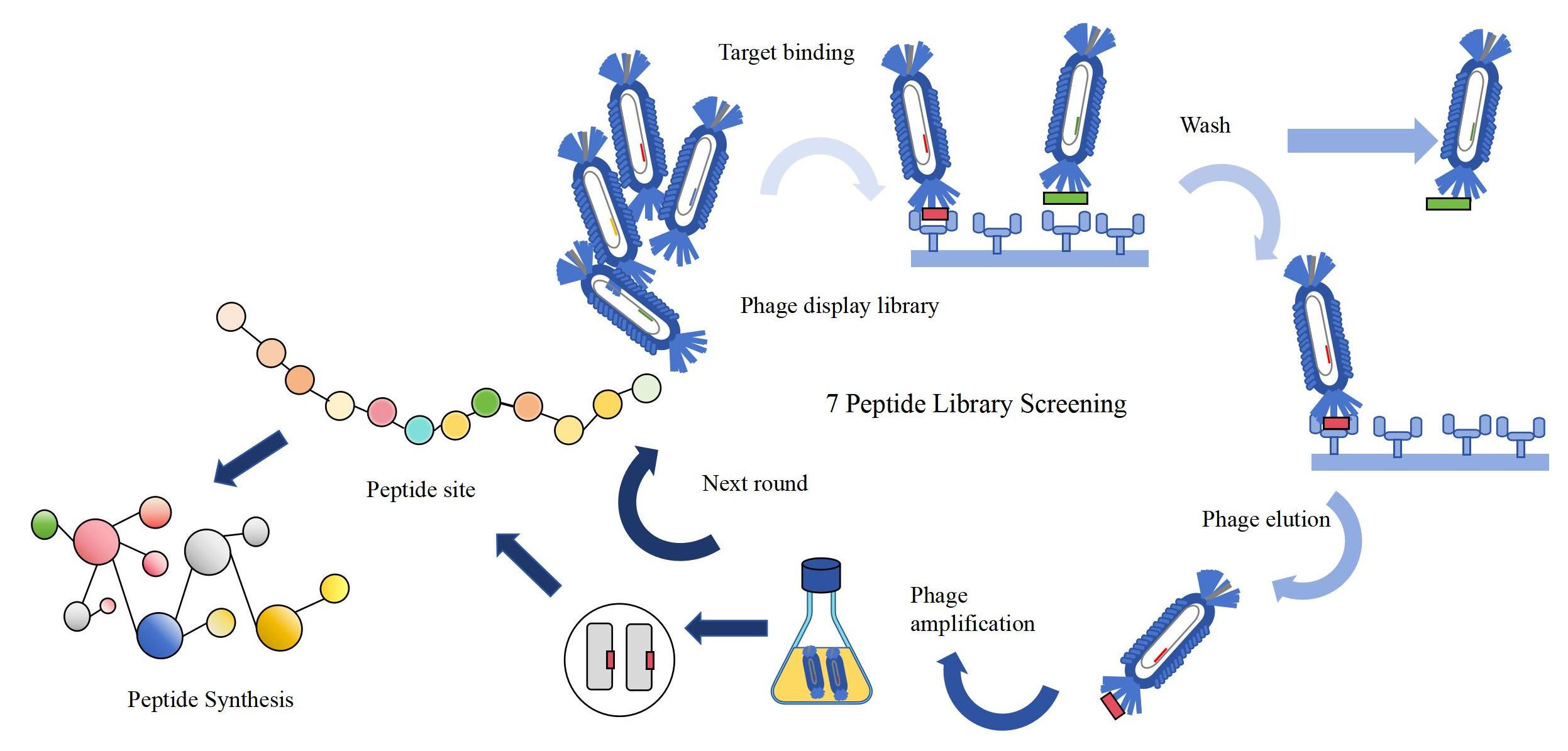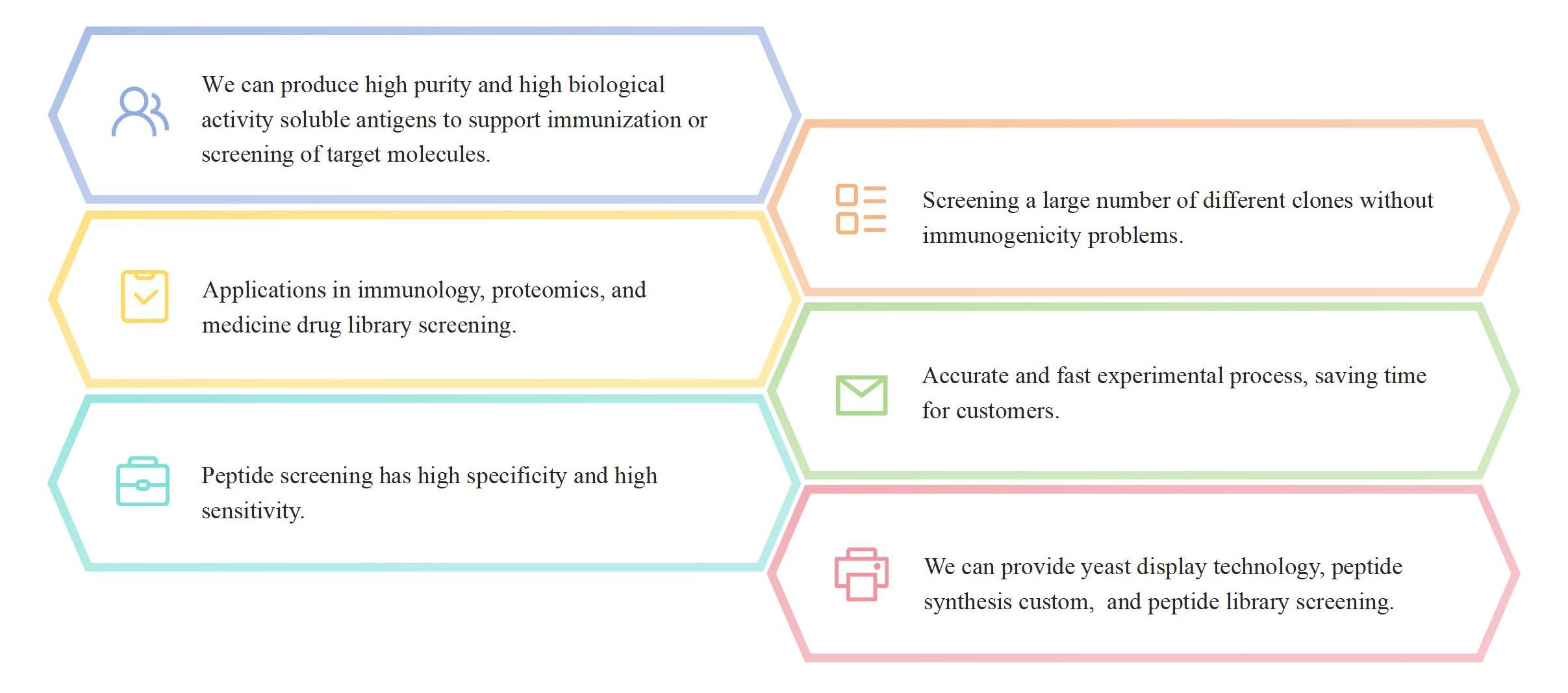Service Line:+86-022-82164980
Address:FL-4, Building A5, International Enterprise Community, Tianjin, China
Email:[email protected]
The phage display platform provided by KMD Bioscience is an ultra-high throughput ligand screening method. The peptide library construction platform can construct up to 10^13/ml peptides or antibody clones displayed on phage. After subsequent rounds of library screening, KMD Bioscience can provide up to 10^5 validated peptide or antibody sequences, providing a solid research foundation for searches of subsequent enzyme substrate, protein-ligand, and high-specificity antibodies. Based on the peptide library platform, KMD Bioscience can build a heptapeptide library (7 peptide library), dodecapeptide library (12 peptide library), and cyclic heptapeptide library (cyclic 7 peptide library), etc. for customers.
High-throughput screening methods, such as nanobody phage display or yeast display library, can be utilized to rapidly screen large numbers of peptides for target binding or functional activity.
Applications of 12 peptide Library-Random Peptide Library Screening
To elucidate the physiological functions of hyaluronic acid (HA) from a family of cell-surface glycosaminoglycans, The study used purified HA to biopanning a dodecapeptide phage display library. The premade peptide array screening library, Pep1, can bind to free HA, HA expressed on the cell surface and prevent binding of HA to the HA receptor (CD44) expressed on the cell surface. Correlative studies of this activity of Pep1 demonstrate that HA plays a role in leukocyte migration in inflamed tissues. Miraculously, Pep1 prevented contact dermatitis when applied to the skin and then exposed to a known allergen, demonstrating a link between HA and immune responses to skin irritants with broad clinical implications.
The discovery of a peptide based on the dodecapeptide phage display library laid the foundation for the development of a multivalent inhibitor of anthrax toxin that virtually eliminated anthrax toxicity in rats. The structural domain of anthrax protective antigen (PA) with a heptameric structure was immobilized and the dodecapeptide phage display library was panning. Peptides specifically bound to inactive, unassembled PA were removed using soluble PA monomer washes, and specifically bound peptides were competitively eluted with soluble heptameric PA. Although the resulting peptides were specific for the toxic heptamer PA, the binding was weak, and tetramerization of the peptides on the soluble scaffold improved the binding affinity.
Dodecapeptide Library-Random Peptide Library Construction Service
The dodecapeptide phage display library can thus be thought of as having the equivalent diversity of the heptapeptide library but spread out over 12 residues. In both the heptapeptide and the dodecapeptide phage display peptide libraries, the first residue of the peptide-pIII fusion is the first randomized position, while the first randomized position in the cyclic heptapeptide library is preceded by Ala-Cys. All of the libraries contain a short linker sequence between the displayed peptide and pIII: Gly-Gly-Gly-Ser.
Random oligonucleotide fragments of the 12-mer peptide were synthesized by chemical synthesis and then inserted into the gene encoding the shell protein of the phage vector and transformed into E. coli by genetic engineering recombinant technology. A random 12-mer peptide was fused to the M13 phage minor coat protein (pIII) to form a combinatorial library. The proliferated and generated phages carry exogenous peptides on their surface, and each phage expresses one exogenous peptide on its surface. All these phages constitute a premade random dodecapeptide library.
The target molecule provided by the customer is used to obtain a phage clone that can bind to the target molecule with high affinity after a screening, amplification, and selection step from the whole premade phage random dodecapeptide screening library. By determining the DNA sequence of this phage, the amino acid sequence of the peptide carried by the phage can be known.
Phage Display Antibody Screening-Dodecapeptide Library
Nanobody phage display technology describes a selection technique in which a library of peptide or protein variants is expressed on the outside of a phage virion, while the genetic material encoding each variant resides on the inside. This creates a physical linkage between each variant protein sequence and the DNA encoding it, which allows rapid partitioning based on binding affinity to a given target molecule (antibodies, enzymes, cell-surface receptors, etc.) by an in vitro selection process called screening library. In its simplest form, panning is carried out by incubating a library of phage display peptides on a plate (or bead) coated with the target, washing away the unbound phage, and eluting the specifically bound phage (Fig 1). The eluted phages are then amplified and taken through additional binding/amplification cycles to enrich the pool in favor of binding sequences. After 3-4 rounds, individual clones are characterized by DNA sequencing and binding assays.

Fig 1 Phage display 12 peptide library screening
Dodecapeptide Library-Random Peptide Library Screening Workflow
|
Services Available |
Service Content |
Timeline |
|
Support Multiple Provision Forms |
-Purified protein -Unpurified protein (provides purification services) -Targeted targets |
|
|
Quality Control of Antigens |
Antigen purity testing by SDS-PAGE |
3 days |
|
Peptide Library Screening |
Positive clones recognizing antigen by 3-4 rounds of screening |
2 weeks |
|
Antibody Sequencing |
Positive clone sequencing |
1-2 week |
|
Antibody Quality Control |
Expression of target antibody in E.coli, followed by quality control by Elisa |
1 week |
|
Delivery |
Experimental report and >10 independent peptide clones |
Depends on express |
Advantages of Phage Display Antibody Screening

How to Order?

If you have any questions regarding our services or products, please feel free to contact us by E-mail: [email protected] or Tel: +86-400-621-6806;